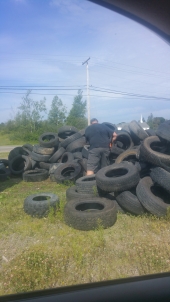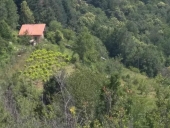




"...In our language this quality is called dadirri. It is inner, deep listening and quiet, still awareness.
Dadirri recognises the deep spring that is inside us. We call on it and it calls to us. This is the gift that Australia is thirsting for...
When I experience dadirri, I am made whole again."
-Miriam - Rose Ungunmerr- Baumann
 3
3




Today I will do what others won't, so tomorrow I can do what others can't.




"...In our language this quality is called dadirri. It is inner, deep listening and quiet, still awareness.
Dadirri recognises the deep spring that is inside us. We call on it and it calls to us. This is the gift that Australia is thirsting for...
When I experience dadirri, I am made whole again."
-Miriam - Rose Ungunmerr- Baumann
 1
1




Fianou Oanyi wrote:
I am a little worried about wind, storms, and occasional hail.... I suppose we can always pack up the tent in a bad storm.
Today I will do what others won't, so tomorrow I can do what others can't.




"...In our language this quality is called dadirri. It is inner, deep listening and quiet, still awareness.
Dadirri recognises the deep spring that is inside us. We call on it and it calls to us. This is the gift that Australia is thirsting for...
When I experience dadirri, I am made whole again."
-Miriam - Rose Ungunmerr- Baumann








Rose Pinder wrote:I'm jealous, sounds like a great plan.
Are you talking about the camping while you are travelling or once you are on the land? They're two different things in my mind eg at the land you can build infrastructure to protect you during storms or have an backup shelter.
"...In our language this quality is called dadirri. It is inner, deep listening and quiet, still awareness.
Dadirri recognises the deep spring that is inside us. We call on it and it calls to us. This is the gift that Australia is thirsting for...
When I experience dadirri, I am made whole again."
-Miriam - Rose Ungunmerr- Baumann




Will Meginley wrote:
Fianou Oanyi wrote:
I am a little worried about wind, storms, and occasional hail.... I suppose we can always pack up the tent in a bad storm.
A valid concern. Most of the large, multi-room tents I've seen are very boxy - not a good shape for wind resistance. There are some things you can do to mitigate that. First off, pay attention to the weather and learn where the prevailing winds blow on your site. Particularly storm winds, which often come from a different direction than normal winds. If normal winds are fine then you'll probably want to plan for storm winds.
- Location: If you have forested land onsite, set your tent up in the trees, but not near any dead trees that might fall over on you in a storm. The trees will dramatically reduce the wind felt at ground level. If you camp at the edge of a clearing, do so on the upwind side. Avoid camping in saddles, gullies, chimneys, canyons, and other V-shaped landforms that funnel wind. Ridge tops are also not generally a good idea, because you'll have no protection from any direction, and the wind will almost always be blowing. Set up your tent so that the most frequently used opening faces downwind.
- Shape: Round and/or dome shaped tents will hold up better in high winds. A big square tent will act like a sail, putting more stress on the tent poles and possibly uprooting poorly placed tent stakes or snapping inadequate guy lines. Tents with a rounded roof will also hold up better against hail since it will just glance off rather than striking dead-on.
- Barriers: If you park your car upwind it will give you some windbreak protection, particularly if it's a taller vehicle like a van or a box truck. You can also make a temporary windbreak using three poles and a large tarp. Combine that with a tarp over the roof and you can have protection from hail as well, plus some outdoor storage space or an outdoor room. Most of the time when a tent fails during a storm it's because a pole snapped, particularly the light-weight aluminum ones. Anything you can do to reinforce the tent poles or prevent the wind/rain/hail from exerting pressure on them makes it less likely that they'll break. Barring a hurricane, the fabric will probably be fine.
And yes, if you know there's a major storm coming you could always strike the tent and find a hotel room for the night.




Jessica Crowder wrote:
I hear that yurts are very wind resistant due to their shape and construction.

|
You guys wanna see my fabulous new place? Or do you wanna look at this tiny ad?
Announcing The World's Largest Collection of 16,000 Woodworking Plans
https://woodworking-plans
|


